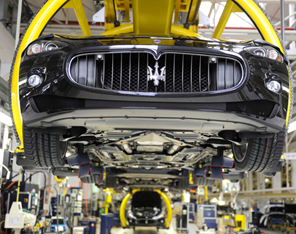 The ASP multidisciplinary project “New forms of work in the automobile industry: toward the factory of the future WCM@FCA” broadly aims at studying new technological paradigms and new forms of organization in manufacturing contexts, with a particular focus on the automotive industry. To understand how to increase productivity, quality and cost efficiency, the team has been required to understand the long-term trends in strategy, technology and organizational forms that are relevant to the future of the automobile industry.
The ASP multidisciplinary project “New forms of work in the automobile industry: toward the factory of the future WCM@FCA” broadly aims at studying new technological paradigms and new forms of organization in manufacturing contexts, with a particular focus on the automotive industry. To understand how to increase productivity, quality and cost efficiency, the team has been required to understand the long-term trends in strategy, technology and organizational forms that are relevant to the future of the automobile industry.
The implementation of World Class Manufacturing programs in FCA plants has represented the setting of the research. Concerning this specific subject, students have been asked to analyse the current state of application of organizational innovations such as WCM principles and practices in FCA plants, to study the problems of replication of WCM best practices across plants, to determine the evolution that WCM application should take in the future depending on industry changes, as well as on specific plants’ conditions, by looking at how the workplace should be redesigned and employees’ skill profile changed.
The World Class Manufacturing is a real integrated production system, already deeply developed with respect to the most “traditional” manufacturing aspects, spread among ten technical pillars. Anyway, especially in regard to the 2020 horizon and the Factory of the Future topics, the manufacturing companies cannot leave out of consideration the support of technological tools and devices for the carrying out of their activities. Technological innovation is not enough if only applied to robots and manufacturing machineries, but it can represent a strong support for the everyday practices of a plant.
Through leveraging new organizational models, innovative layout frames, technological clouding/online platforms, this project aims at providing feasible solutions to enhance workers involvement, productivity and contribution to continuous improvement.
Overall aim of the project is the individuation of standard organizational best practice frameworks based on the analysis of selected model plants, Giambattista Vico in Pomigliano d’Arco and Avv. Giovanni Agnelli Plant in Grugliasco, through the understanding of the feasibility and applicability of proposed solutions in different productive environments.
Principal Academic Tutor
Emilio Bartezzaghi, Management Engineering, Politecnico di Milano
Academic Tutors
Raffaella Cagliano, Management Engineering, Politecnico di Milano
Paolo Neirotti, Management Engineering, Politecnico di Torino
Luciano Pero, MIP, Politecnico di Milano
External institutions
Fiat Chrysler Automobiles
FIM-CISL
External tutors
Luciano Massone, Head of WCM EMEA Region & WCM Dev.Center VP Fiat Chrysler Automobiles
Alessandro Leverano, Fiat Chrysler Automobiles
Alberto Cipriani, FIM-CISL
Team members
Marco Alforno, Architecture Construction City, Politecnico di Torino
Nicole Blandin Savoia, Industrial Production and Technological Innovation Engineering, Politecnico di Torino
Silvia Bucelli, Engineering and Management, Politecnico di Torino [Team Controller]
Giacomo Levi, Management Engineering, Politecnico di Milano [Communication Coordinator]
Alberto Nebiolo, Industrial Production and Technological Innovation Engineering, Politecnico di Torino
Enrico Terzi, Automation and Control Engineering, Politecnico di Milano
Yimin Xu, Architecture, Politecnico di Milano
